Fox News Flash top headlines for October 20
Fox News Flash top headlines are here. Check out what's clicking on Foxnews.com.
When it comes to the tapestry of health, consider fiber an essential thread that weaves its benefits throughout your body.
Beyond being an important digestive aid, fiber plays a pivotal role in maintaining optimal health, nutritionists say.
Fiber is exclusive to plant foods and is a component of a plant that is difficult for the human body to digest. As a result, it has positive benefits to the body like binding LDL cholesterol, maintaining low cholesterol levels, protects and enhances the body's gut health and more. From nurturing gut microbiota and promoting heart health to stabilizing blood sugar levels and aiding in weight management, fiber does all of that and more.
As Jaclyn Fodor, a Boston-based registered dietitian and owner of Nutrition Counseling of New England, put it, "Fiber is an essential component of a healthy diet that offers a range of benefits, especially for digestive health."
Fodor also notes that since it's a type of carbohydrate that the body cannot digest, it passes relatively intact through the digestive system.

Nutritionists recognize fiber as an essential part of any healthy diet, especially when you want to focus on your digestive health. (iStock)
"There are two main types of dietary fiber: soluble and insoluble, each contributing to various aspects of digestion and overall well-being," she said.
She reiterated that fiber is an important component of our diet because it promotes regular bowel movements, supports gut health, aids in weight management, stabilizes blood sugar levels and can lower cholesterol levels.
Fiber decreases inflammation, allows the body to maintain regular bowel function and bowel consistency, helps store food in the body, has a positive impact on blood sugar including balancing and avoiding imbalances and much more.
"Your gut is the foundation for 70% of your immune system."
"Most people associate fiber with bowel movements and bowel regulation, but it impacts so much more," Christina Palmisano, MS, MBA, RDN, told Fox News Digital. Palmisano is a functional and integrative dietitian at Being Functional Nutrition.
She has a master's degree in nutrition from Case Western Reserve University and other accolades and certifications.
BE WELL: IMPROVE YOUR GUT HEALTH WITH 5 TOP TIPS FROM A NUTRITIONAL THERAPIST
"It's a key component for overall health."
Fiber plays an important role when it comes to weight maintenance and management, satiety and feeling fullness, said Palmisano; it connects to so many processes in the body.
"Your gut is the foundation for 70% of your immune system," she said. "If your gut is out of whack, your health is likely out of whack."
Men should look to consume at least 30 to 38 grams a day, while women should shoot for at least 21 to 25 grams of fiber a day, Mayo Clinic reports.
What are the health risks to too much fiber?
"You can have some GI distress," Palmisano said. "In my experience, this is the biggest health risk which isn't health risk but an unfortunate symptom."
If you're new to incorporating fiber into your diet, Palmisano recommends starting with 10–15 grams per day and increasing to the recommended 35 grams per day.
"Fiber is so challenging to digest, you could overwhelm your GI system, experience gas and constipation, especially if you're not drinking enough water while consuming a high fiber diet."
There are many fiber sources that can assist you in meeting your daily intake goals. Choose your favorite foods that are high in fiber and begin adding more of them, and a variety of them, into your diet.
WHAT YOU SHOULD ORDER AT MCDONALD'S, ACCORDING TO NUTRITIONISTS
Palmisano recommends whole food forms that are high in fiber versus broken down food forms like fiber bars.
"An alternative to a bar that's high in fiber or protein is a handful of nuts or dry roasted almonds paired with an apple," she said.
"Or a cup of berries with nut butter or another variation of a handful of nuts and seeds. Your body is more likely to break it down and tolerate it."
Fiber and constipation: How does it help?
"Fiber aids in digestion because the insoluble fiber bulks up stools and helps them move through the digestive tract more efficiently. Fiber also stimulates the muscles in the intestines to promote rhythmic contractions known as peristalsis," said Fodor.
"This movement helps move food through the digestive tract and prevents stagnation. Both types of fiber absorb water, which softens the stool and facilitates its passage through the intestines."
THESE ARE THE WORST DRINKS FOR YOUR HEALTH, ACCORDING TO NUTRITIONISTS
Constipation is caused by "excessively slow movements of the undigested food residue" through a person's large colon, said Dr. Joan Salge Blake, a registered dietitian nutritionist and nutrition professor at Boston University.
"As this residue passes through the colon, water is absorbed, which causes the formation of solid waste products called stool," said Salge Blake, who is also the host of the nutrition and health podcast "SpotOn."

High-fiber diets are particularly helpful when trying to reduce the pain of constipation and other GI issues. (iStock)
"If the stool hangs around too long in your colon, too much water will be reabsorbed, creating hard, dry stools that are more difficult and painful to get rid of," she added.
"A high-fiber diet can act as a freight train to keep things moving along in your GI [gastrointestinal] tract and reduce the likelihood of constipation."
Overall, a diet meeting your needs in fiber could be effective in helping to alleviate constipation and promote regular bowel movements, Fodo said.
"Insoluble fiber (whole grains, vegetables, fruit) add bulk to stool which helps it move throughout the digestive tract. Soluble fiber (oats, legumes and some fruit) soften the stool into a gel-like substance making it easier to pass," she said.
WHITE POTATOES VS. SWEET POTATOES: NUTRITION AND HEALTH EXPERTS CHIME IN ON WHICH IS BETTER
Fiber can also act as a prebiotic, Fodor said, which is good for gut bacteria.
"A healthy gut microbiome is important for overall digestive function, including regular bowel movements," she said.
She said that to help with constipation, natural ingredients that can be added to someone's diet to boost fiber intake include psyllium husk, chia seeds or flax seeds.
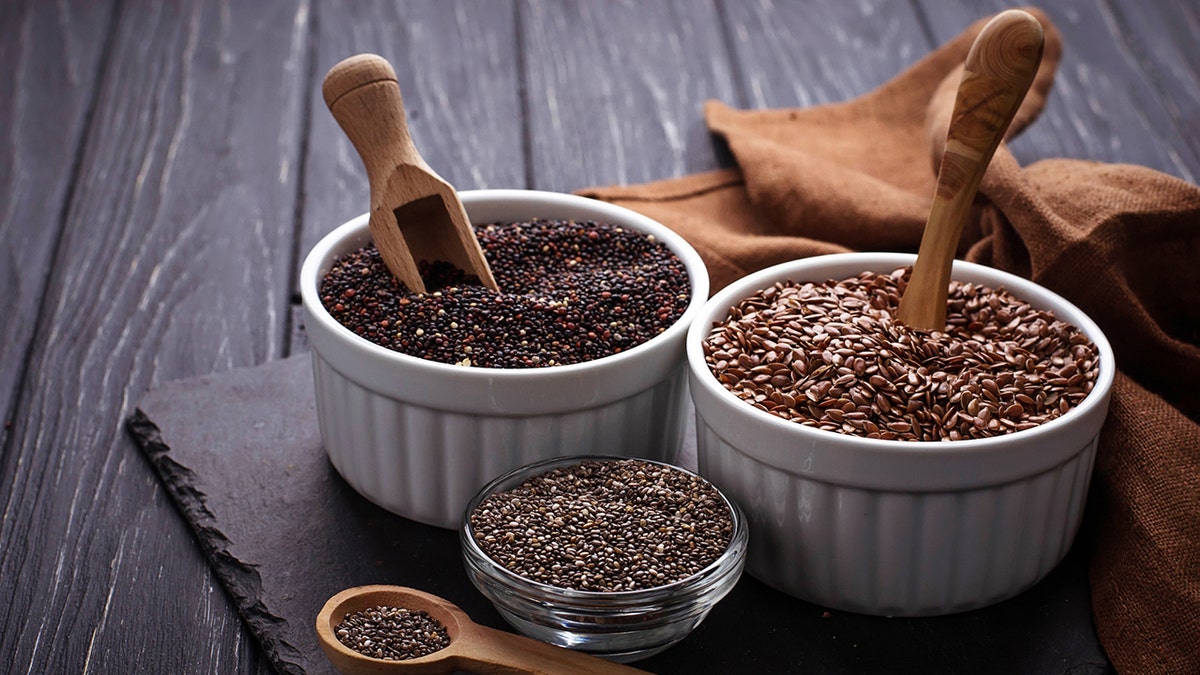
Flax seeds and chia seeds are two great natural ingredients that can be used to boost your fiber intake. (iStock)
If you want to increase your fiber intake, Salge Blake advises doing so slowly and to stay hydrated.
"If you add too much fiber at once, this can cause GI discomfort and also some negative social ramifications (gas)," she said.
Don’t overlook breaking a sweat to stave off constipation, either.
"Staying active will help move things along in your GI tract."
"Physical activity is important. When you move, your GI tract moves. So, staying active will help move things along in your GI tract," Salge Blake noted.
BE WELL: EAT WALNUTS EVERY DAY FOR A HEALTHY GUT AND HEALTHY HEART
Fiber-rich super foods to incorporate into your diet regularly:
- Raspberries
- Any kind of berries
- Beans
- Nuts and seeds
- Oatmeal
- Non-starchy vegetables
- Kiwi
- Lentils
- Avocado
- Whole grains
- Potato and butternut squash
1. Raspberries
Fodor calls raspberries a "nutritious gem."
And they pack eight grams of dietary fiber per cup.
They also taste great and are "packed with disease-fighting properties," said Fodor.
Plus, raspberries are high in fiber at eight grams per cup and are high in antioxidants such as vitamin C and plant chemicals called flavonoids, which also have antioxidant effects, said Fodor.
THESE ARE THE 8 BEST FRUITS FOR YOUR HEALTH, ACCORDING TO NUTRITIONISTS
"Antioxidants help the body eliminate free radicals which may result from external factors, such as pollution and unhealthful foods," she added.
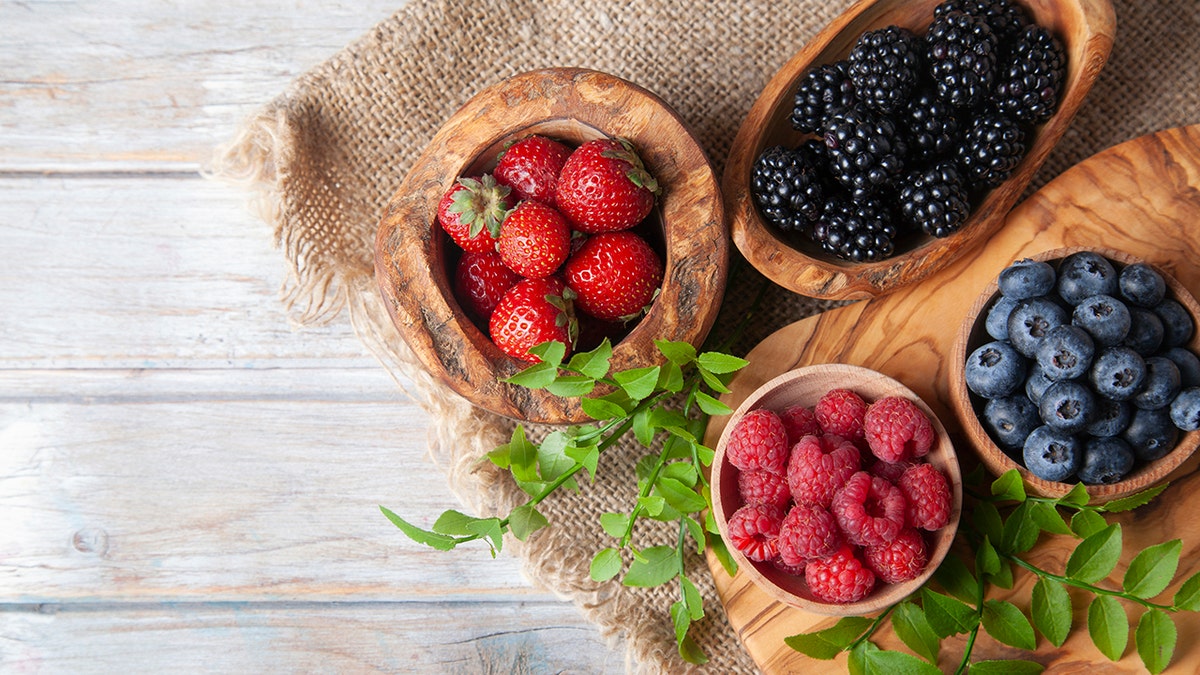
"One cup of blackberries or raspberries contains eight grams of dietary fiber, about one-third of your daily need," Jennie Waegelein, a New York-based registered dietitian, told Fox News Digital. (iStock)
2. Any kind of berries
Along with raspberries, consider munching on blueberries, strawberries and blackberries.
"Berries are one of the best foods we can eat, period," said Jennie Waegelein, a registered dietitian in private practice at JM Wellness based in New York City, who focuses predominantly on gut/hormone health as well as sports.
"They contain numerous antioxidants, vitamins and minerals and phytonutrients to help us thrive daily."
One cup of blackberries or raspberries contain eight grams of dietary fiber, "about one-third of your daily need," Waegelein added.
BERRY-FILLED FROZEN YOGURT 'BARK' IS A COOL, CREAMY SUMMER TREAT: TRY THE RECIPE
Love putting blueberries on your oatmeal, in yogurt or in smoothies?
A cup of blueberries contains about four grams of fiber.
Strawberries, meanwhile, pack three grams of fiber per cup, according to nutritionists.
3. Beans
Along with lentils, add another member of the legume family — beans — to your diet to boost your fiber intake.
"A mere ½ cup of cooked kidney beans will provide eight grams of fiber," said Salge Blake.
Beans also contain some viscous soluble fibers, she noted.
"This type of fiber can also aid in relieving constipation, as their water-attracting capability allows the stool to increase in bulk and form a gel-like soft texture, which makes it easier to pass," she said.
SAVORY OATMEAL IS THE LATEST VIRAL FOOD TREND TO PUT A TWIST ON THE BREAKFAST STAPLE
"Beans are also a good source of protein, so you get ‘two for the price of one’ when you add them to your diet."
4. Nuts and seeds
Palmisano says a high-fiber category of food that is overlooked is nuts and seeds. She recommends chia and flax seeds, which continue 8–10 grams of fiber per serving.
"We focus so much on grains when it comes to fiber, but there are other foods out there that are even better," she said.
Additionally, pumpkin seeds, sesame seeds, almonds and pistachios are a great source of fiber.
5. Oatmeal
Salge Blake said oatmeal is also a great source of viscous soluble fiber, which can aid in constipation as mentioned above.
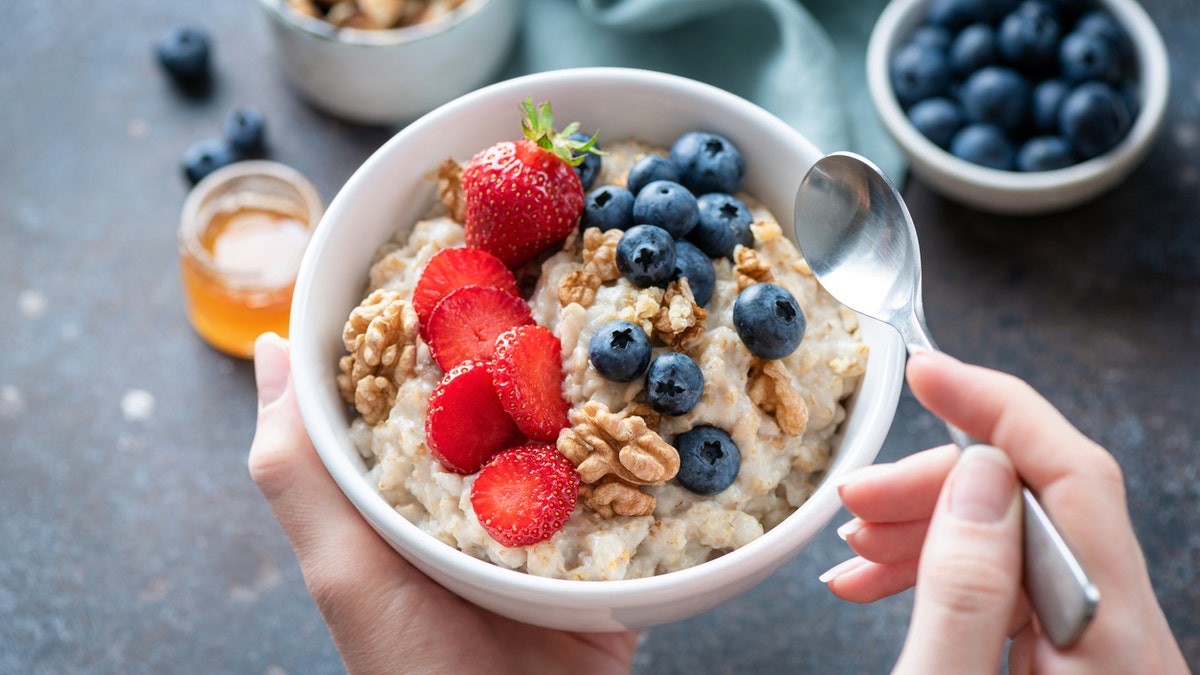
Oatmeal is full of fiber, with one cup equaling four grams of fiber. (iStock)
"A cup of cooked oatmeal will provide four grams of fiber. Have them cooked or as overnight oats, as a high fiber way to start your day," suggested Salge Blake.
6. Non-starchy vegetables
"The best place to get fiber is non-starchy vegetables," said Palmisano. She recommends kale, broccoli, carrots, spinach, Brussels sprouts, tomatoes and peppers, which are also packed with plenty of micronutrients.
7. Kiwis
Here’s another fruit you may want to include in your high-fiber diet.
"Kiwi fruits contain a unique mix of fibers and polyphenols, which have been shown to both support the gut bacteria via a prebiotic effect together with providing laxative benefits," said Kara Landau, a prebiotic registered dietitian at Gut Feeling Consultancy and nutrition adviser to the Global Prebiotic Association in Chicago.
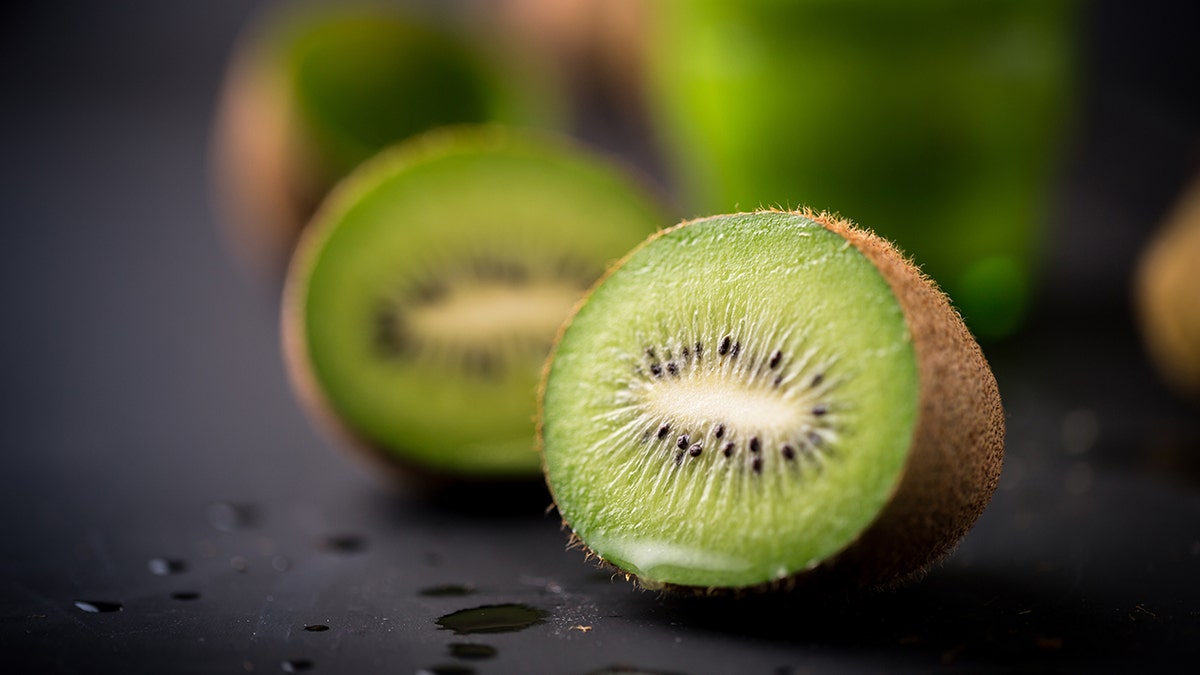
Kiwis contain a mix of fiber and other important nutrients that "support the gut bacteria," one registered dietician told Fox News Digital. (iStock)
"Studies show that consuming two golden kiwi fruits per day can help with constipation and assist with the passing of bowel motions similarly to including psyllium husk."
LIVER, INSECTS, SARDINES — OH MY!: 8 'GROSS' FOODS THAT NUTRITIONISTS SAY YOU SHOULD EAT
One kiwi has approximately two grams of fiber.
If you bought an organic kiwi, wash and then eat the kiwi with the skin to maximize your fiber consumption.
8. Lentils
Lentils are a solid high-fiber option because this food is high in protein, said Waegelein; it adds a plant-based option for vegans and vegetarians.
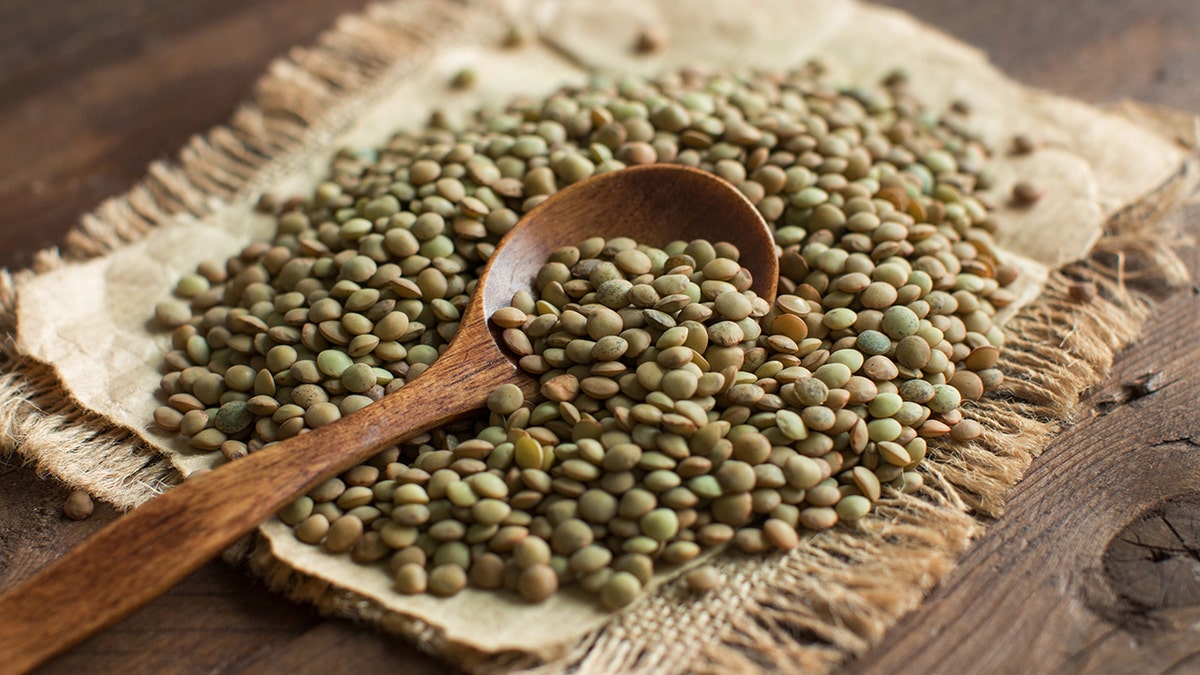
Lentils are not only high in fiber, but also are high in protein and serve as a great plant-based protein option for vegans or vegetarians. (iStock)
"Lentils are an incredible nutrient source high in potassium, fiber and folate," said Fodor, adding that one cup of lentils packs 16 grams of dietary fiber.
CLICK HERE TO SIGN UP FOR OUR LIFESTYLE NEWSLETTER
"Lentils are inexpensive, easily accessible and simple to cook, making them a powerhouse nutrient dense food."
9. Avocados
This green fruit (yes, it’s a fruit) is a great source of fiber, which surprises a lot of people because of its creamy consistency, said Fodor.
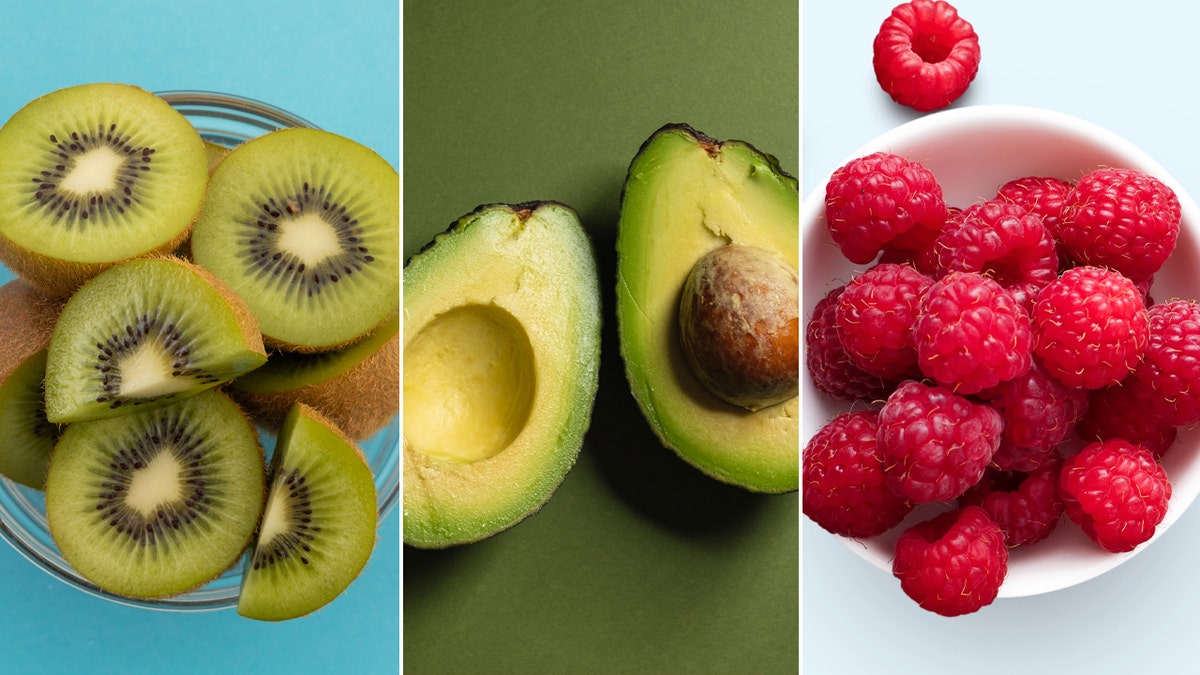
Fiber plays an important role in your health, especially if you are combating constipation or other GI issues, say experts. (iStock)
Avocados contain heart-healthy unsaturated fats and vitamins B, C, E and K, she said, pointing out that one medium avocado contains 10 grams of dietary fiber.
"Avocados are an excellent source of fiber," said Palmisano. "They're a great source of healthy fat and they contain a bunch of vitamins."
CLICK HERE TO GET THE FOX NEWS APP
Bonus: They are packed with carotenoids, "which have been associated with a reduced risk of chronic disease," she added.
10. Whole grains
Oats, barley and quinoa are high in fiber and easily added to plenty of meals. Of the three, barley contains the most fiber per serving at six grams per one cup of cereal grain.
11. Potato and butternut squash
Potatoes, sweet potatoes and butternut squash are all high fiber foods, too.
For more Lifestyle articles, visit www.foxnews.com/lifestyle.










































